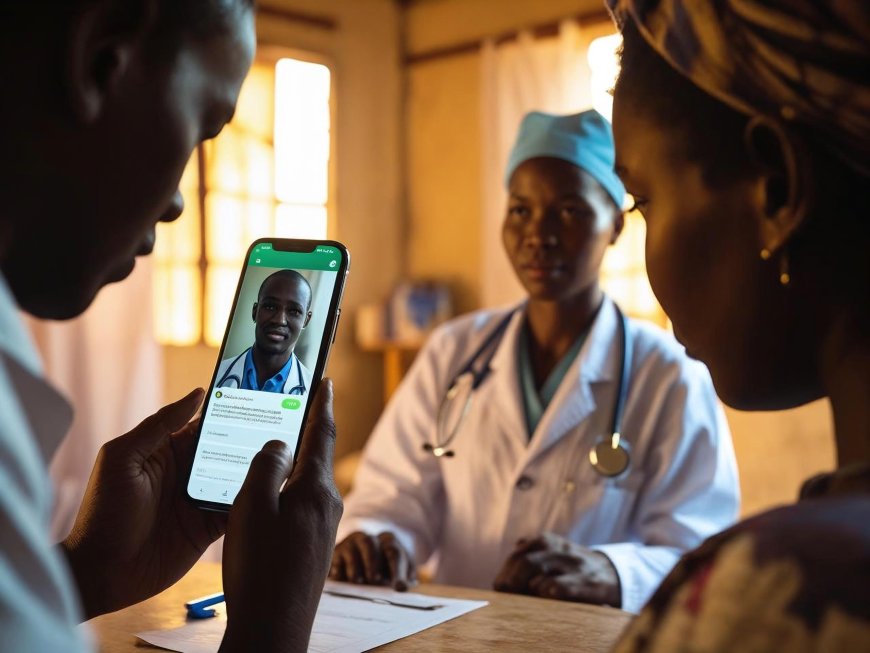WhatsApp-Based Telemedicine: A Game-Changer for Low-Income Patients
How WhatsApp is quietly transforming healthcare for low-income patients in Africa. From free consultations to chronic disease check-ins, discover why this everyday app might just be the continent’s most underrated digital health hero.

"He who has health has hope, and he who has hope has everything." — African proverb
Once upon a Tuesday afternoon in Kibera, a mother sent a WhatsApp message to a doctor 8 km away: “My son has a rash on his chest and is coughing at night.” The doctor replied with a voice note, asked for a photo, and prescribed an over-the-counter antihistamine—all before the evening rain started. No queue. No fare. No stress.
Welcome to WhatsApp-based telemedicine, where healthcare comes to your chat screen—delivered faster than Nairobi traffic on a Sunday.
Why WhatsApp? Why Not?
Because, dear reader, WhatsApp is the oxygen of African digital life. It’s on nearly every smartphone from Lagos to Lusaka. Data bundles are structured around it. Even your 73-year-old grandmother forwards “Good morning” prayers on it every day at 6:03am sharp.
In 2023, WhatsApp had over 93% penetration among smartphone users in Sub-Saharan Africa (DataReportal, 2023). So while healthtech founders were building fancy apps nobody downloaded, clever startups and NGOs just said: “Let’s use what people already love.”
Case Study 1: Dokitari Smart (Kenya)
This Nairobi-based startup uses WhatsApp to run consultations for low-income earners in informal settlements. A user sends a voice note describing symptoms, a nurse triages, and a doctor follows up via call or message. Prescriptions are sent digitally to nearby chemists.
A client in Kawangware shared: “I used to pay KSh 300 just to go to the clinic. Now I ask my question on WhatsApp, and I only pay when needed. Sometimes the advice is even free!”
Visit: https://www.dokitarismart.co.ke
Case Study 2: 54Gene x WhatsApp (Nigeria)
Though best known for genomic work, 54Gene also piloted WhatsApp-based COVID-19 symptom check-ins and information dissemination. During lockdowns, it became a vital lifeline for patients needing health updates and medical advice.
Why? Because nothing travels faster than gossip in a WhatsApp group—except verified medical information that looks like gossip.
Case Study 3: Hello Doctor (South Africa)
Hello Doctor offers access to doctors via WhatsApp chat, especially for patients on low-cost medical schemes. Their system triages simple conditions and escalates serious ones to live calls or referrals.
"If you want to go fast, go alone. If you want to go far, use WhatsApp." Okay, maybe that’s not the exact proverb, but you get the idea.
The Benefits: Why It Works Like a Charm
1. Low Cost
Forget expensive apps. No installation needed. Just open WhatsApp and chat. For low-income patients, this means less spending on transport, registration, and time off work.
2. Language & Literacy Flexibility
Text, voice notes, photos—even emoji symptoms (yes, we’ve seen someone report stomach pain with 💩). WhatsApp’s multimedia magic fits all literacy levels.
3. Trust Factor
People already trust WhatsApp more than random health apps. It’s personal, instant, and private.
4. Scalable Public Health Tools
Governments and NGOs can blast health messages, combat misinformation, or conduct follow-ups quickly—without building new tech.
But Wait—Is It Safe?
Here’s the tea: WhatsApp uses end-to-end encryption, so chats are secure. But medical privacy isn’t just about encryption—it’s also about confidentiality culture. If your cousin borrows your phone and opens your WhatsApp, well… that's a different story.
So yes, WhatsApp is a powerful tool, but startups and clinics must train staff on ethical handling of patient data, and ideally, integrate WhatsApp with electronic health record systems.
Tools like WATI and Twilio WhatsApp API are already enabling this by offering automated flows and secured backend integrations.
But Will It Replace Hospitals?
Of course not. Even a prophet in the village needs a real clinic now and then. WhatsApp is not a replacement, but a frontline extension—a digital triage nurse with fast fingers.
Think of it like a boda-boda in a health system full of matatus. Not luxurious, but it gets you there when you need it most.
Final Word: When the Solution Is Already in Your Pocket
You know what’s wild? The same app we use to argue over football and send memes is saving lives quietly and affordably.
For many low-income patients across Africa, WhatsApp is the difference between ignoring a symptom and getting help. Between panic and peace of mind.
"Even the smallest mosquito can disturb your sleep." — African proverb
In healthcare, even the simplest tool—used well—can disrupt the system.
References
DataReportal. (2023). Digital 2023: Sub-Saharan Africa. https://datareportal.com/reports/digital-2023-sub-saharan-africa
Dokitari Smart. (2024). Affordable healthcare through WhatsApp. https://www.dokitarismart.co.ke
Hello Doctor. (2024). Doctor in your pocket. https://www.hellodoctor.co.za
Twilio. (2024). WhatsApp Business API. https://www.twilio.com/whatsapp
WATI. (2024). WhatsApp Business tool for engagement. https://www.wati.io
What's Your Reaction?
 Like
0
Like
0
 Dislike
0
Dislike
0
 Love
0
Love
0
 Funny
0
Funny
0
 Angry
0
Angry
0
 Sad
0
Sad
0
 Wow
0
Wow
0





















































